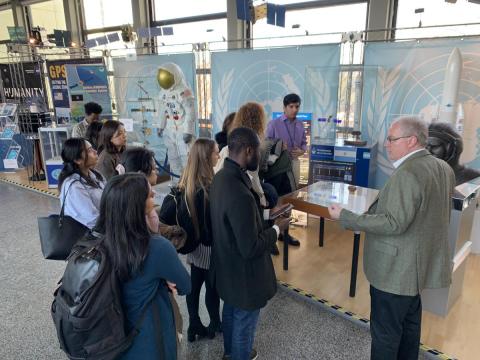
The students from the OSUN's Network Collaborative Course "Introduction to Geospatial Analysis" and "Earth Observations for Monitoring SGDs" course led by the CEU’s Environmental Systems Laboratory, recently visited the 61st session of the Scientific and Technical Subcommittee of the Committee on the Peaceful Uses of Outer Space (COPUOS), held from January 29th to February 9th, 2024, at the United Nations Office in Vienna. This session provided an invaluable learning experience, profoundly investing in the application of space technologies to address climate change, monitor sustainable use of resources, and explore innovative solutions for global health challenges.
The COPUOS 2024 session covered a wide range of topics focusing on the use of space technologies for socio-economic development and support of disaster management. These discussions are crucial for understanding the international cooperation required for the sustainable use of outer space and the role of space policy, law, science, and technology.
Attending COPUOS allowed students to immerse themselves in a global forum where over 60 countries were represented, offering a unique opportunity to network with experts and practitioners from diverse backgrounds. The sessions at COPUOS broadened the perspective of visiting students as well as enhanced their professional development, particularly in the application of geospatial and space-based technologies to solve pressing global issues.
“As a student with a background in international relations, I never expected that my first real immersion into international life at the UN would lead through space technologies,” says Stefaniya, the Environmental Science & Policy master student taking CEU courses on "Introduction to Geospatial Analysis" and "Earth Observations for Monitoring SDGs". “I think it is amazing that students get opportunities to be exposed to various domains where GIS and remote sensing start to break in as the main methods for understanding and managing global issues. That’s fantastic: on a personal computer, one can have a whole set of tools and data available for almost every possible kind of spatial analysis, and I serve an example that literally anyone can do it.”
Students and faculty from the Open Society University Network (OSUN) member institutions also engaged with the event online by following the broadcast of the meetings. This collective involvement underscores academic institutions' commitment to connecting with the international community and contributing to shaping the future of space exploration and its peaceful use.
GeoHub's presence at the COPUOS 2024 session reflects the project’s dedication to fostering an environment where students can engage with international policy discussions and develop skills critical for their future careers in the field of application of geospatial technologies for societal benefit.